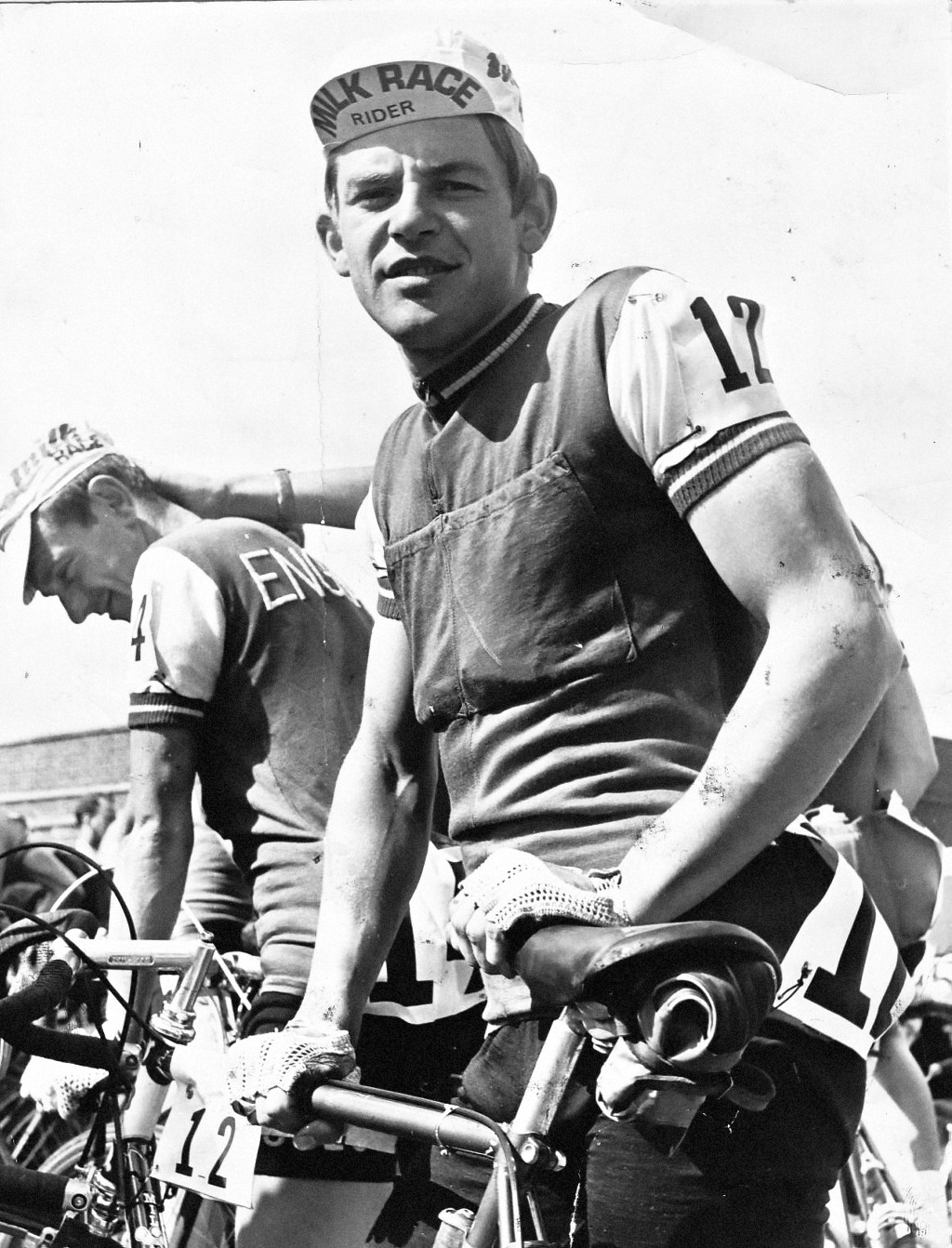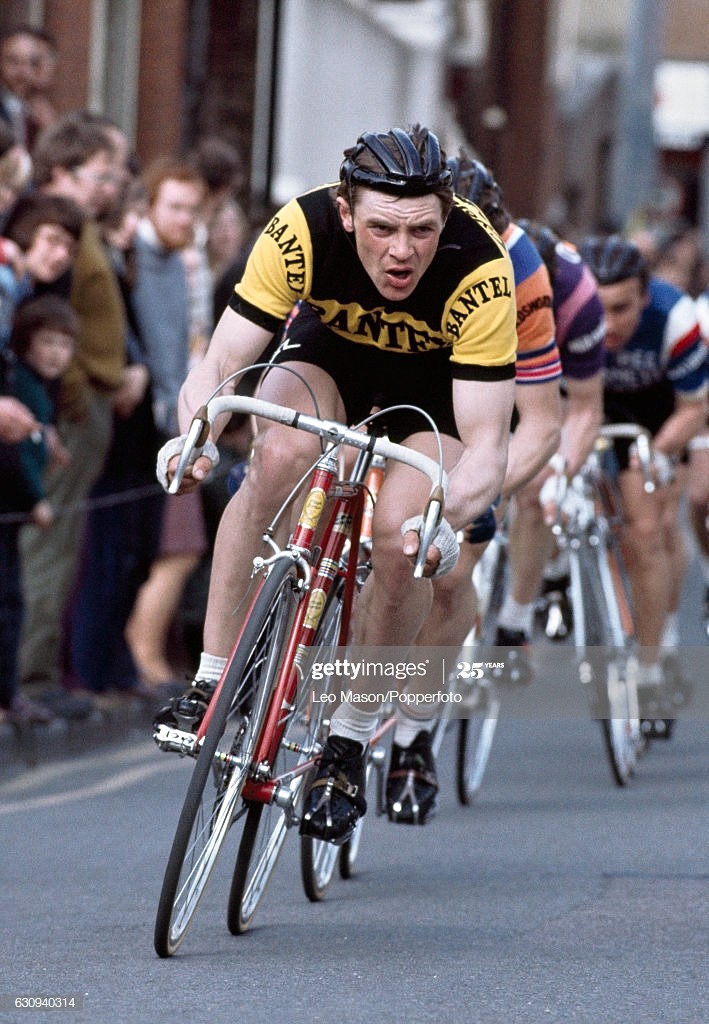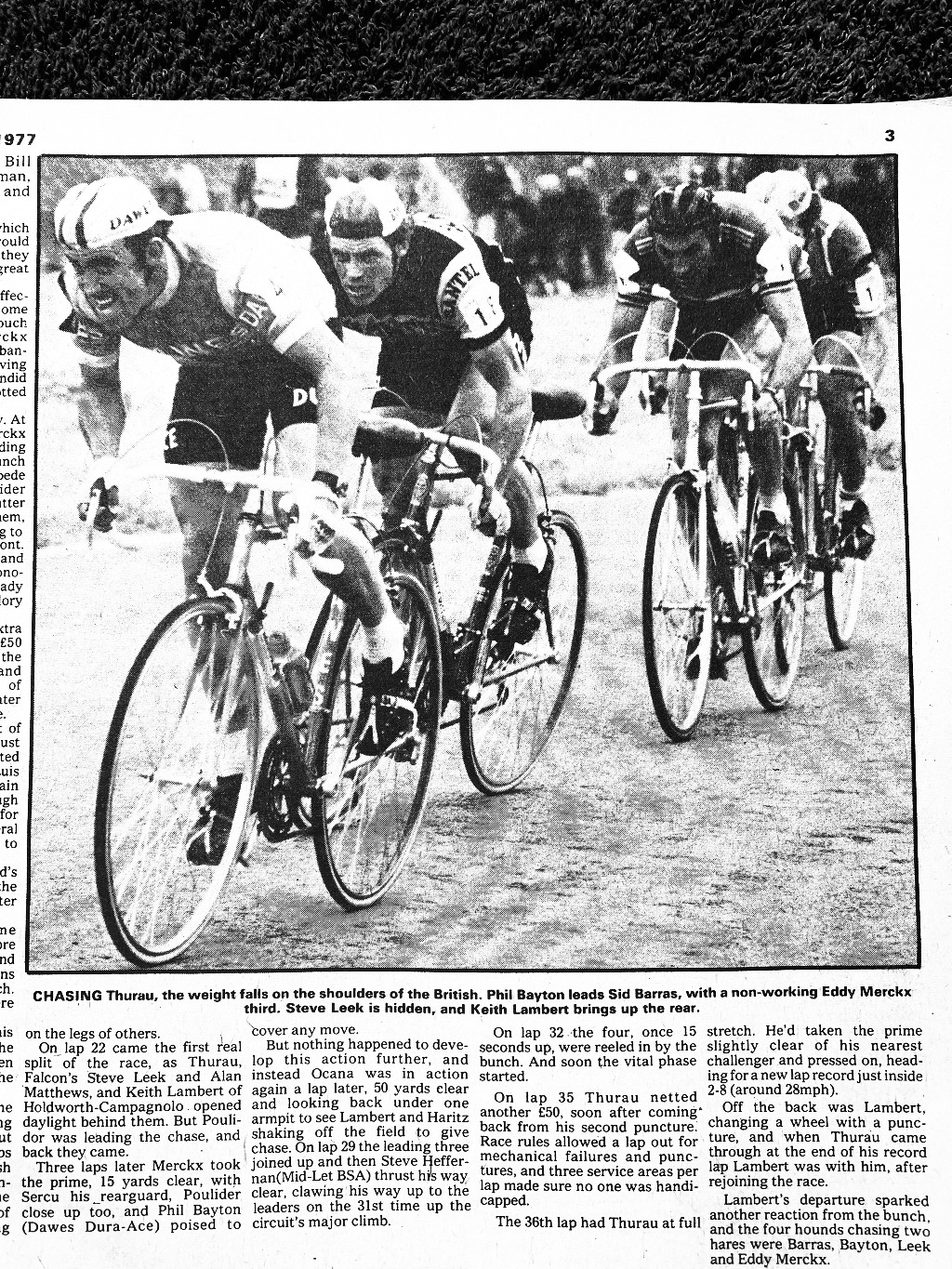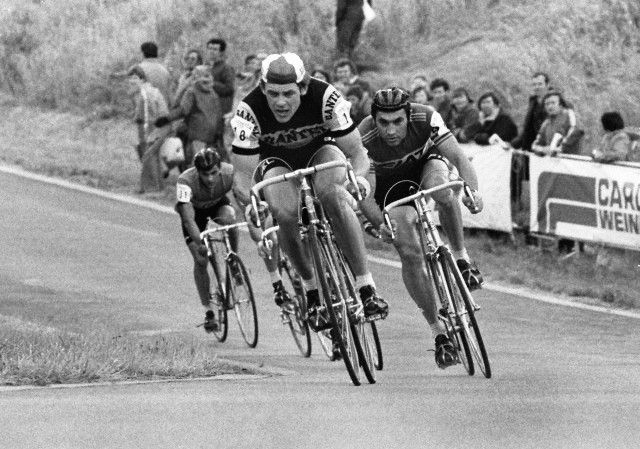‘Super Sid’ was what they called him; his tarmac graffiti artist fans used to paint; “screw ‘em Sid!’ on any suitable stretch of road surface. Sid Barras was his Sunday name and few people have won more bike races than this man.
A fixture on the British professional scene for 18 years from 1970 onwards, it was high time we caught up with him.
Sid, just how many raced did you really win, we’ve seen it quoted variously from 197 up to 380?
“I won 80 as an amateur including three in the Milk race and one in the Scottish Milk Race and I won Star Trophy races like the Chequers GP.
“As a pro, excluding green jerseys, just first across the line it was 197; so a total of 277 would be about right.
“Some would say I was just plain greedy!
“Winning a bike race gives you a ‘high’ for a week, I was on a permanent ‘high’ for 20 years.
“My doctor tells me I have an ‘addictive personality,’ I was glad my addiction was to winning bike races and not anything else.”

You won those amateur races in a good era for British amateur road racing.
“There were an awful lot of good races back then but the reason I turned pro was that I felt my performances weren’t being recognised.
“In 1967 I rode the Tour of the Border and your man Billy Bilsland won every stage; then I did the same in ’68, I won every stage.
“That result got me a ride in the England team for the Milk Race where I won two stages and was fifth on final GC, I believe I could have made the final GC podium but I was young, still finding my feet and wasn’t as confident as I could have been.
“Those performances put me on the short list for the 1968 Mexico Olympics.
“The next big test was the Manx International which was won by John Bettinson, I wasn’t going to chase him – he was my team mate in the Milk Race – but I was looking to be second, then I punctured with a half mile to go. Billy Bilsland was second and I finished fifth.
“Then there was a big event at South Shields but because I was on the list for Mexico they’d given me all the inoculations just a few days prior to the race, I had to climb off after 10 miles; I just couldn’t ride at all.
“The Scottish Milk Race was another selection race; I was out to debunk the notion that I was, ‘just a sprinter’ – I always considered myself a good all-round bike rider who could sprint.
“There was one stage from Ayr to Dunbar, one side of Scotland to the other some 210 kilometres away; I took off on my own with around 20 miles to go but Peter Doyle the Irishman, and the famous Polish rider Józef Gawliczek got up to me with a half mile to go.
“Coming in to Dunbar they started to look at each other, they’d forgotten about me thinking I’d be finished after my solo… but I jumped them with 200 yards to go and won it.
“When they announced the Mexico team I was non-traveling reserve, despite 19 wins that season – that put me at odds with authority.”

You signed with Bantel for 1970.
“As I said, I was at odds with the authorities, they passed over me for Worlds selection in 1969 and there was an incident in the Milk Race.
“I won the stage into New Brighton but then on the stage into Stoke in the finishing straight Brian Jolly jumped and went from one side of the road to the other, I followed him but he won the stage.
“There was a big pile up behind and I got the blame and was penalised 10 minutes. After the stage Martyn Roach came up to me and said; ‘it was nothing to do with you or Brian, the Kiwi guy Bryce Beeston rolled a tub, I saw it happen.’
“I was totally disenchanted with authority so when Hughie Porter ‘phoned me at the end of 1969 and said there was a place on the Bantel team for 1970 I took up the offer.
“Apart from anything else it was costing me a fortune in travel costs, up in the North East and having to drive all over the country.”
You took to the pro scene quickly with seven wins in that first season.
“I had my first win in April, the sprints were certainly faster than among the amateurs; I had to gear one sprocket higher.”
And you rode the Worlds in Gap, France – finishing 22nd that was a good ride.
“It was very, very hot that day and my ride could have been better, top 10 I believe but for punctures – and Barry Hoban chasing me down didn’t help!”
[More of Sid v. Baz in part two of the interview, ed.]
You were with Bantel 1970 to 1973 then Raleigh ’74/’75, the inevitable question – what about Mr. [Peter] Post?
“It wasn’t for me, living in a cellar.
“We were down in the South of France for the early season ‘training’ races, it was either in Nice or Antibes, three were away but I won the big bunch sprint got fourth place.
“I told Post and all he could say was; ‘you didn’t win, eh?’
“We did all those races down there but after them whilst the Dutch guys flew home whilst the six Brits were in the back of the mechanic’s van back to Belgium.
“When we got back to Belgium, Dave Lloyd, Phil Bayton and I ended up having to sleep in a brothel!
“I had one night of that then one to stay at Mrs. Deene’s until the folks from the Plum Vainqueur bike shop fixed me up with a cellar where I did my own cooking and washing – I stuck that out until the end of June then came back to the UK.”
Back to Bantel after two seasons with Raleigh.
“The good thing about Raleigh was that they paid strong money but Bantel more than matched it so I was happy to go back.”
The win everyone remembers was that stage in the Tour de Suisse but you had wins in Spain and the US and strong rides in races like the Trofeo Laigueglia, did you ever think about trying your hand on the continent?
“Things were different back then, I didn’t get any offers after that Swiss win in ’73 despite that fact that I beat the likes of Paolini and Van Springel in the sprint.
“That stage was 215 kilometres with a couple of third cat. climbs along the way.
“It was a composite Bantel/Holdsworth team and Colin Lewis knew the finish; he did a power of work for me in the last 10/15 K. Colin was an excellent rider… under-rated, I think.”
You won the London to Holyhead twice, ’70 and ’77, a race-and-a-half that one.
“That was 265 miles with small fields so there was no getting sucked along in the peloton – and that thing was when I won it in ’77, there was no time to savour the win, we had a crit in Oxford the next day.”

I remember watching you and Hughie Porter dismembering the field in the 1977 Scottish Milk Race.
“When Hughie got the bit between his teeth he could just sit there on the front for mile after mile – he was World Professional Pursuit Champion four times, don’t forget.
“We were down two men in that race, we started one man short than lost another through injury.
“I lead that race from the start. I won Stage One in Glasgow from the late Stanislav Szozda of Poland; he was one of the best amateurs in the world in that era – he was World Road Race and Team Time Trial Champion and he won the Peace Race.
“He fought me all the way to the line in the uphill sprint for that first stage then he attacked me relentlessly through the rest of the race.
“On the stage into Aberdeen there was a big climb on the parcours, the Cairn o’ Mount, and he attacked me from the start of it until the top but I hung on to him. At the top he sat up and he shook my hand.
“Off the climb it came back together and Hughie took over until the last mile; it was a big wide, straight finish along the sea front with us all in the right hand gutter and the wind coming off the sea.
“I was maybe eight or nine wheels back when the commissaire’s car passed us on the left with 500 yards to go, I saw it, kicked flat out and aimed for it.
“I didn’t get pace from it but it was my ‘hare,’ I won the stage, the Czechs and Poles protested but the commissaires couldn’t really do anything because it was their car!
“I won the overall GC on that one by the time bonuses I picked up; Szozda was second overall and the Czech Michal Klasa third. He was another great rider with Peace Race, Tour de l’Avenir, Sealink, Tour of Slovakia and Tour of Poland stages to his credit.”

We were also at Eastway when you finished second to Thurau in the Glenryck Cup in ’77.
“People think I won that but it was just because I beat Merckx for second place, Raleigh’s German Champion Didi Thurau was away on his own for the win.
“The mistake I made that day was to show my hand. There were some £50.00 primes on offer and I won a couple to make sure I was taking some money home with me but Thurau and Merckx realised then that I was pretty quick.
“I got a lot of publicity for that ride, it was televised and I got a nice bonus from the team.
“But folks do tend to forget that Thurau had three laps out that day…”
And although Sid didn’t mention it, Cycling Weekly editor Ken Evans who reported that race for his magazine reckoned that there was an ‘arrangement’ between the Belgian maestro and the young German.
In Part Two we talk to Sid about his winning the British Professional Road race Championship in 1979 after a decade of trying for that beautiful striped jersey, from … Barry Hoban.



